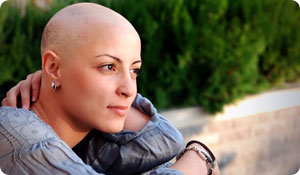
Radiation and chemotherapy can cause side effects that range from simply annoying to very serious. While most eventually disappear after treatment concludes, understanding and learning to cope with typical and unexpected side effects will help you better navigate the challenges of cancer treatment.
Common Side Effects
Just because certain side effects are common, that doesn't mean you will necessarily experience all-or even any-of them. Furthermore, some side effects are typically associated with specific types of cancers. For example, patients with head and neck cancers are more likely to experience mouth and throat changes.
Here are some of the typical side effects.
- Nausea
- Fatigue
- Hair loss
- Diarrhea, constipation, or urinary difficulties
- Appetite changes
- Insomnia
- Mouth and throat sores or trouble swallowing
-
Sexuality and fertility changes
Unanticipated Side Effects
Chemotherapy-induced peripheral neuropathy (CIPN).
Chemotherapy can damage nerves in your extremities. If you experience numbness, tingling, burning, or pain in your arms, fingers, legs, toes, or you have that pins-and-needles feeling, you may have CIPN. If your CIPN is serious, your physician may reduce your dose of chemotherapy or postpone treatment.
Chemo Brain
This tongue-in-cheek name describes a not-so-funny phenomenon. Chemotherapy drugs are toxic to your central nervous system and can compromise your mental faculties. Symptoms of chemo brain include difficulty retaining verbal or visual memories or maintaining your attention and concentration. You might find it takes you longer to process information. Fortunately, chemo brain usually subsides after treatment concludes.
Here are a few tips for coping with chemo brain:
- Develop relaxation techniques to help you focus
- Set a regular daily routine
- Exercise
- Simplify your work life/environment
- Use external memory aids
Allergic Reaction
Allergies to chemotherapy drugs can be life threatening. If you experience any of these symptoms, go to the emergency room immediately:
- A sudden or severe itch
- Rash or hives
- Wheezing or trouble breathing
Regardless of the type or severity of your treatment side effects, it's important to get eight hours of sleep daily, drink plenty of fluids, and avoid caffeine and alcohol. Avoid foods that cause swallowing discomfort. Don't use dietary supplements without discussing it with your physician. They can cause unexpected problems during cancer treatment.
Tell your doctor about any symptoms you experience, no matter how mild. Treating and managing side effects is a key component of cancer treatment. You should not suffer quietly.
Sources:
"Side Effects Limiting Chemotherapy." Aetna Intelihealth. Web. 28 April 1999.
http://www.intellihealth.com/IH/ihtIH?c=220694
Kuroi, Katsumasa, Shimozuma, Kojiro, Ohashi, Yasuo, Takeuchi, Ayano, Aranishi, Toshihiko, Morita, Satoshi, Ohsumi, Shozo, Watanabe, Toru, Bain, Stacey, and Hausheer, Frederck H. "A Questionnaire Survey of Physicians' Perspectives Regarding the Assessment of Chemotherapy-induced Peripheral
Neuropathy in Patients with Breast Cancer." Japanese Journal of Clinical Oncology 38(11) (2008): 748-754. Web.
http://jjco.oxfordjournals.org/cgi/reprint/38/11/748
Canadian Cancer Society. "Side effects of chemotherapy." Web. 9 December 2009.
http://www.cancer.ca/Ontario/About%20cancer/Treatment/Chemotherapy/Side%20effects%20of%20chemotherapy.aspx
Burmeier, Beverly. "Chemo Brain." The Cancer Center. Web.
http://demo.cancerconsultants.com/Content.aspx?Section=cancertreatment&DocumentID=42628
National Cancer Institute. "Radiation Therapy and You: Support for People With Cancer." Web. 20 April 2007.
http://www.cancer.gov/cancertopics/coping/radiation-therapy-and-you
National Cancer Institute. "Chemotherapy side effects." Web.
http://www.cancer.gov/cancertopics/coping/chemo-side-effects





